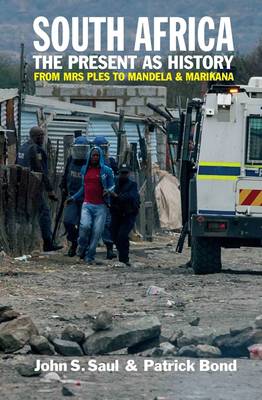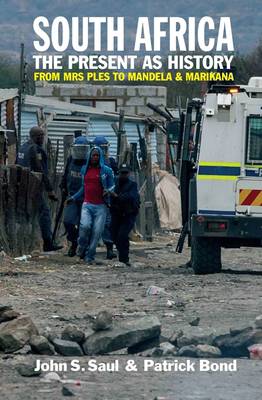
- Retrait gratuit dans votre magasin Club
- 7.000.000 titres dans notre catalogue
- Payer en toute sécurité
- Toujours un magasin près de chez vous
- Retrait gratuit dans votre magasin Club
- 7.000.0000 titres dans notre catalogue
- Payer en toute sécurité
- Toujours un magasin près de chez vous
South Africa - The Present as History
From Mrs Ples to Mandela and Marikana
John S Saul, Patrick Bond
Livre broché | Anglais
59,95 €
+ 119 points
Format
Description
In 1994, the first non-racial elections in South Africa brought Nelson Mandela and his African National Congress to office; elections since have confirmed the ANC's hold, both popular and legitimate, on power. Yet, at the same time, South Africa has one of the highest rates of protest and dissent in the world - underscored by the police shooting of 34 striking miners at Marikana in 2012 - regions of deep poverty and environmental degradation, rising inequality and high unemployment rates. This book looks at this paradox by examining the precise character of the post-apartheid state, and the roots of the hope that something better than the semi-liberation that the ANC has presided over must not be long delayed - both within the ANC itself and within the broader society of South Africa. The authors present a history of South Africa from earliest times, with today's post-apartheid society interpreted and understood in the context of and through the lens of its earlier history. Following the introduction, which offers an analytical background to the narrative that follows, they track the course of South African history: from its origins to apartheid in the 1970; through the crisis and transition of the 1970s and 1980s to the historic deal-making of 1994 that ended apartheid; to its recent history from Mandela to Marikana, with increasing signs of social unrest and class conflict. Finally, the authors reflect on the present situation in South Africa with reference to the historical patterns that have shaped contemporary realities and the possibility of a 'next liberation struggle'. Shortlisted for the 2014 Tamara and Isaac Deutscher Prize John S. Saul is Professor Emeritus at York University (Canada). Patrick Bond is Senior Professor of Development Studies and Director of the Centre for Civil Society at the University of KwaZulu-Natal (Durban). Southern Africa (South Africa, Namibia, Lesotho, Swaziland
Spécifications
Parties prenantes
- Auteur(s) :
- Editeur:
Contenu
- Nombre de pages :
- 312
- Langue:
- Anglais
Caractéristiques
- EAN:
- 9781847011350
- Date de parution :
- 21-04-16
- Format:
- Livre broché
- Format numérique:
- Trade paperback (VS)
- Dimensions :
- 156 mm x 234 mm
- Poids :
- 439 g

Les avis
Nous publions uniquement les avis qui respectent les conditions requises. Consultez nos conditions pour les avis.






